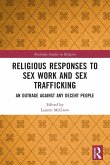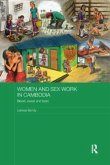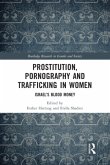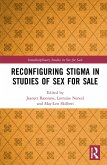This book presents an analysis of the concepts of female empowerment and resilience against violence in the informal entertainment and sex industries.
Generally, the key debates on sex work have centred on arguments proposed by the oppressive and empowerment paradigms. This book moves away from such debates to look widely at the micro issues such as the role of income in the lives of sex workers, the significance of peer organisations and networks of women, and how resilience is enacted and empowerment experienced. It also uses positive deviancy theory as a useful strategy to bring about notable changes in terms of empowerment and agency for women working in this sector and also for addressing the wider issues of migration, HIV/AIDS, and violence against women and girls. The focus is on moving beyond a victimisation framework without downplaying the extent of the violence that women in this industry experience. It conceptualises the theories of empowerment and power which have not been tested against women who work in this sector, combined with in-depth interviews with women working in the industry as well as academics, activists, and personnel in the NGO and donor sector. In doing so, it informs the reader of the numerous social, political, and economic factors that structure and sustain the global growth of the industry and analyses the diverse factors that lead many thousands of women and girls around the world to work in this sector.
The work presents an important contribution to the study of citizenship and rights from a non-Western angle and will be of interest to academics, researchers, and policymakers across human rights, sociology, economics, and development studies.
Generally, the key debates on sex work have centred on arguments proposed by the oppressive and empowerment paradigms. This book moves away from such debates to look widely at the micro issues such as the role of income in the lives of sex workers, the significance of peer organisations and networks of women, and how resilience is enacted and empowerment experienced. It also uses positive deviancy theory as a useful strategy to bring about notable changes in terms of empowerment and agency for women working in this sector and also for addressing the wider issues of migration, HIV/AIDS, and violence against women and girls. The focus is on moving beyond a victimisation framework without downplaying the extent of the violence that women in this industry experience. It conceptualises the theories of empowerment and power which have not been tested against women who work in this sector, combined with in-depth interviews with women working in the industry as well as academics, activists, and personnel in the NGO and donor sector. In doing so, it informs the reader of the numerous social, political, and economic factors that structure and sustain the global growth of the industry and analyses the diverse factors that lead many thousands of women and girls around the world to work in this sector.
The work presents an important contribution to the study of citizenship and rights from a non-Western angle and will be of interest to academics, researchers, and policymakers across human rights, sociology, economics, and development studies.
"The book Sex Work, Labour and Empowerment by Sutirtha Sahariah is indeed remarkable. And in myriad ways. ...The entire analysis is rigorous both conceptually and theoretically, each statement being supported by ground evidence, by women's testimonies, as well as by extensive interspersion of major relevant works germane to the central issues at debate. ...Those researching on this issue as well as on labour and migrant rights would undoubtedly find this book extremely effective as a basis for extended advocacy and action."
Professor Ritu Dewan is the Vice President of the Indian Society of Labour Economics, and former President of the Indian Association for Women's Studies (2014-17).
Professor Ritu Dewan is the Vice President of the Indian Society of Labour Economics, and former President of the Indian Association for Women's Studies (2014-17).
"The book Sex Work, Labour and Empowerment by Sutirtha Sahariah is indeed remarkable. And in myriad ways. ...The entire analysis is rigorous both conceptually and theoretically, each statement being supported by ground evidence, by women's testimonies, as well as by extensive interspersion of major relevant works germane to the central issues at debate. ...Those researching on this issue as well as on labour and migrant rights would undoubtedly find this book extremely effective as a basis for extended advocacy and action."
Professor Ritu Dewan is the Vice President of the Indian Society of Labour Economics, and former President of the Indian Association for Women's Studies (2014-17).
Professor Ritu Dewan is the Vice President of the Indian Society of Labour Economics, and former President of the Indian Association for Women's Studies (2014-17).








